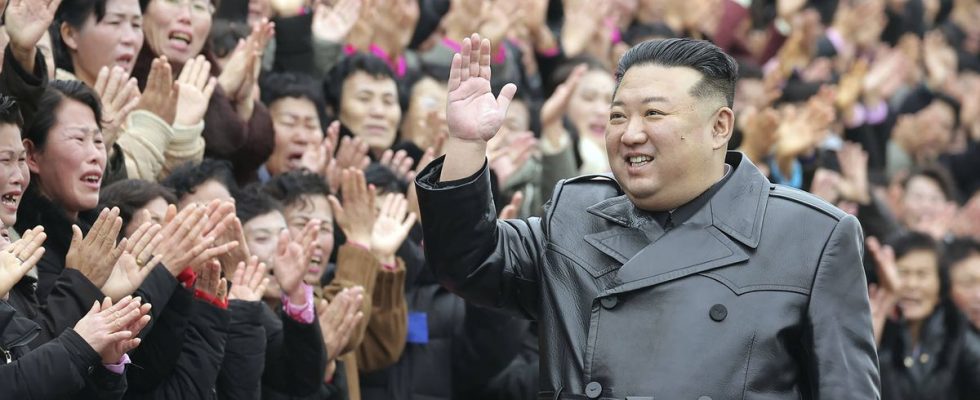North Korean leader Kim Jong-un declared South Korea his “main enemy,” disbanded agencies dedicated to reunification, fired serial missiles and threatened war over any territorial violations “even if only by 0.001 mm”. The failures of the North Korean number 1 are numerous, after ten years in power. And, particularly affected by the Covid-19 pandemic, Pyongyang had slowed down the pace of its armed provocations for two years. The recovery is here. Is this escalation of threats and this fiery rhetoric a way for Pyongyang to have a voice on the international stage? 20 minutes takes stock as Kim Jong-un said this month that he had “no intention of avoiding war”.
What is the situation ?
After years of deterioration in their relations, Pyongyang formalized its position in mid-January by threatening to “annihilate” the South in the event of war. This is an important change because “in the past, when there was a risk of armed conflict, there was an escape route to maintain control, but now there is none at all.” that,” observes Hong Min, an analyst at the Korea Institute for National Unification in Seoul.
North Korea has gotten rid of “any inter-Korean mechanism aimed at preventing conflicts from spiraling out of control”, he adds. According to him, “the fact that the North describes the South as the ‘main enemy’ is not just rhetoric: words could turn into action.”
Are we heading towards an invasion of South Korea?
The North Korean leader affirmed that he would not “unilaterally” trigger a conflict, but that he had “no intention of avoiding a war” either. He said he no longer recognizes the de facto maritime border between the two Koreas, called the “Northern Boundary Line” (NLL), and the North Korean military recently held live artillery exercises in the region.
This has created “an increasing possibility of a military skirmish between the two sides, which could lead to a wider conflict,” Hong Min said. In addition, Pyongyang has moved closer to Moscow, including – according to Washington and Seoul – by delivering missiles used in its recent major attacks on Ukraine, in exchange for help for its satellite program.
So, what’s the next step?
According to Choi Gi-il, a professor of military studies at Sangji University, the two Koreas now have the “highest probability of being drawn into armed conflict.” “Suppose a future provocation from the North causes civilian and military casualties. We aim at the point of origin with shells. But are we also going to hit them with aerial means? », he asks.
In 2010, when the North bombed the South Korean border island of Yeonpyeong, killing four, Seoul’s F-16 fighter jets were “in the air, ready to strike, but then-President Lee Myung -bak, canceled the operation” in order to avoid escalation. “If we have a similar incident, there is no guarantee that air power will not be used given the hawkish calls” from the South Korean administration. And Pyongyang’s response “could lead to a real war in the worst case”, declares the expert.
Should we abandon any idea of reconciliation between the two Koreas?
Prospects for inter-Korean reconciliation have long been bleak. But by calling his neighbor enemy number 1, Kim Jong-un “has not only closed the door to rapprochement, he has padlocked it so that the South Koreans know clearly what his position is with regard to their relationships,” said Soo Kim of LMI Consulting, a former CIA analyst. But, according to her, Pyongyang’s new rhetoric does not necessarily change “North Korea’s calculus.”
Pyongyang has a long history of developing nuclear weapons and missiles and Mr Kim is waiting for the right moment to carry out his seventh nuclear test. “These weapons were not developed overnight, and the Kim regime’s plans to use them as tools of coercion, threat and negotiation have been their modus operandi for decades,” the expert emphasizes.
So, what exactly does Kim Jong-un want?
Kim Jong-un’s recent rhetoric towards the South “seems to be an ideological adjustment for the regime’s survival, justifying Kim Jong-un’s emphasis on nuclear missiles,” said Leif-Eric Easley, professor at Ewha University in Seoul. Despite years of border closures linked to Covid-19 and strict controls on the flow of information within the country, North Koreans “are increasingly aware of their country’s economic failures compared to South Korean successes,” according to him. “Thus, Kim Jong-un is redoubling his military prowess against external threats to establish his internal legitimacy,” observes Leif-Eric Easley.
The South is due to hold legislative elections in April, during which President Yoon Suk Yeol’s conservative party will try to regain control of Parliament. And our expert adds: “Kim Jong-un could also try to politically punish the Yoon administration for its policies towards Pyongyang before the elections. »

